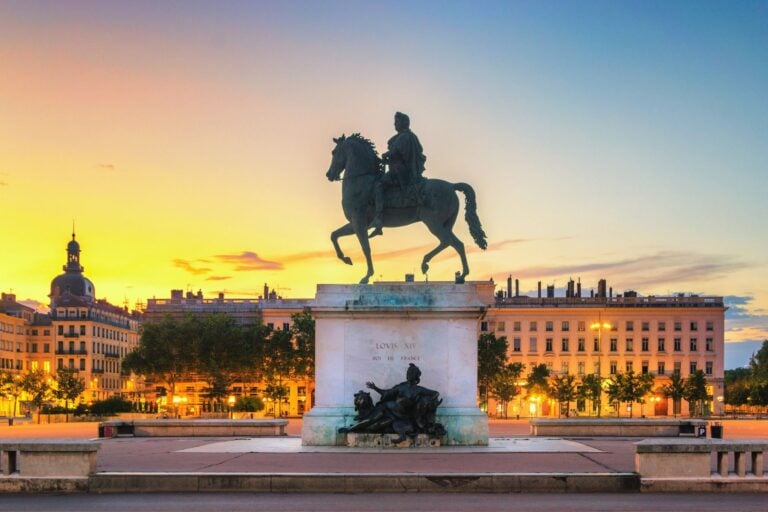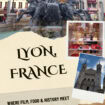
Lyon is a charming city with a rich tapestry of history, art, cinema and gastronomy. Nataliya and I sampled a bit of each as we explored the city for the first time.
Often hailed as the gastronomic capital of France, Lyon promises a feast for the palate, senses and imagination.
The Rhône and Saône rivers carve through the city, their banks adorned with vibrant parks, bustling promenades, and elegant bridges connecting the city’s historic quarters.
Strolling along the river, we admired the graceful arches of Pont de la Guillotière, the oldest bridge in Lyon, and the striking modern design of Passerelle du Palais de Justice, each offering breathtaking cityscape views.
The riverside pathways led us through meeting spaces where locals lounged on benches, children laughed on carousels and cyclists whizzed past, adding to the dynamic yet relaxed atmosphere.
Read More: Top 10 Things to Do in France
Place Bellecour: The Heart of Lyon

Our journey began with a leisurely stroll to Place Bellecour, one of Europe’s largest open squares, measuring an impressive 312 by 200 meters. Dominating the square is the majestic equestrian statue of Louis XIV, a testament to Lyon’s regal past.
The square buzzed with life—locals meeting for coffee, children playing near the fountains and tourists capturing memories against the backdrop of historic architecture.
At the Lyon Tourist Office, situated within the square, we procured our Lyon City Passes and a map from the friendly workers there. Their enthusiasm was infectious as they highlighted the myriad of attractions accessible with the pass, most within walking distance.
Traboules: Lyon’s Secret Passages

Curiosity led us to explore Lyon’s famed traboules—hidden passageways weaving through buildings, connecting streets in a labyrinthine network.
Initially constructed in the 4th century to provide direct access to the Saône River, these passages later facilitated the silk industry’s transport of goods, shielding delicate fabrics from the elements.
During World War II, the traboules played a crucial role in the French Resistance, offering clandestine routes to evade German forces. Navigating these dimly lit corridors, with their spiral staircases and Renaissance courtyards, felt like stepping back in time.
The Cathedrals and Churches of Lyon

Dominating the skyline from its hilltop perch, the Basilica of Notre-Dame de Fourvière offers a breathtaking panorama of Lyon. Its ornate façade, adorned with mosaics and intricate carvings, reflects both Romanesque and Byzantine influences.
Inside, the golden-hued mosaics and soaring vaulted ceilings created an atmosphere of divine grandeur.
Lower in the city, the Cathédrale Saint-Jean-Baptiste stood as a medieval marvel, its astronomical clock—a 14th-century masterpiece—marking time with celestial precision.
Strolling through the city, we also admired the quieter, hidden churches, each with its own storied past, offering moments of reflection amidst our bustling explorations.
The Fresque des Lyonnais

At first, you think you’re looking at people in their windows, doorways and on their balconies. However, the Fresque des Lyonnais is a fresco that pays homage to Lyon’s most famous historical figures.
Spanning the façade of a building, this lifelike painting features the Lumière brothers (pioneers of cinema), chef Paul Bocuse, Antoine de Saint-Exupéry (author of The Little Prince) and other notable residents. The result is an open-air art gallery that blends past and present into one scene.
The Roman Ruins at Fourvière

Lyon’s Roman past is preserved in the ruins of Fourvière, where an ancient theater still hosts performances. The theater was empty of performances and open for visitors as we walked among the weathered stone seating, but seeing it seemed a performance of its own.
Just as Lyon is smaller than the more frequently visited Paris, Lyon’s Fourvière neighborhood features a tower much like its bigger cousin. Lyon’s tower is about a third the size of the Eiffel Tower, but it is still the highest point in Lyon.
The Lumière Brothers and the Birth of Cinema
A visit to Lyon would be incomplete without paying homage to Auguste and Louis Lumière, the pioneers of early cinema. Their former residence now houses the Institut Lumière, a museum dedicated to their groundbreaking contributions.
Nestled in a quiet district, the mansion stands as a testament to their ingenuity. Inside, we explored the evolution of filmmaking, from the first motion pictures to the technological advancements that followed.
The centerpiece was the Cinématographe, the Lumière brothers’ revolutionary invention that captured and projected moving images, forever changing the way images relay stories.
Among the historic reels, we watched L’Arrivée d’un train en gare de La Ciotat. According to legend, this iconic short film once sent audiences scrambling in fear as a locomotive seemed to barrel toward them.
The museum’s interactive exhibits allowed us to handle replicas of early cameras and projectors, bridging the gap between past and present in the world of cinema.
Musée Miniature et Cinéma: A Cinematic Wonderland

Perhaps because of the Lumière brothers’ connection, cinema is a part of the city. We meandered through Vieux Lyon’s cobblestone lanes to the Musée Miniature et Cinéma.
Housed in a Renaissance building, this museum is a treasure trove for film aficionados and art lovers alike. Here are some of the items we discovered during our visit:
- Triceratops Head from Jurassic Park: The life-sized head of the sick Triceratops from Spielberg’s classic almost looked our way as we watched it.
- The Golden Idol from Raiders of the Lost Ark: Gleaming under the spotlight, the infamous fertility idol from the first sequence of Indiana Jones had me wishing we had a sandbag with us.
- Princess Leia’s Metal Bikini from Return of the Jedi: Encased in glass, the iconic costume worn by Carrie Fisher during her captivity in Jabba’s palace was displayed with accompanying stills from the film.
- Gremlins Puppets: A collection of mischievous Mogwai and their sinister Gremlin counterparts looked ready to wreak havoc on visitors.
- Alien and Predator Exhibits: The menacing presence of the Alien Queen and a Predator warrior loomed in a dimly lit corner. The intricate biomechanical design of H.R. Giger’s Alien and the detailed armor of the Predator were so lifelike we almost wanted to run.
- Beetlejuice Props: The eerie, humorous world of Beetlejuice was brought to life with original costumes and props from Tim Burton’s cult classic. Seeing the iconic black-and-white striped suit and grotesquely distorted faces from the film’s afterlife sequences reminded us of Burton’s early blending of macabre and whimsy.
- Ghostbusters Equipment: The proton gun, ghost trap, and ecto-containment units had us just a little bit ‘fraid o’ ghosts.
Movie Memorabilia

Other film memorabilia included costumes from The Fifth Element, props from Blade Runner, and the mechanical hand from Terminator 2: Judgment Day, rounding out a collection celebrating the magic of storytelling through practical effects.
Wes Anderson’s Miniature Sets, showcasing sets from Anderson’s films, including scenes from Isle of Dogs and Asteroid City, were almost a transitional piece between the cinema and miniature sections of the museum.
The pastel hues and symmetrical design were quintessentially Anderson, offering insight into his whimsical cinematic universe.
Miniature Marvels

The miniature exhibits were nothing short of mesmerizing. Each diorama, crafted with painstaking detail, transported us into a Lilliputian world.
One particularly captivating piece depicted a quintessential Parisian apartment, complete with tiny croissants on a minuscule kitchen table and delicate lace curtains fluttering at the windows.
Another showcased a vintage Lyonnais silk workshop, the looms and spools rendered precisely. There were theater halls, schools, markets, stores, a bicycle leaning against a stone wall in a cobblestone alley, and living spaces of all kinds.
The play of light and shadow in these miniatures created an illusion so convincing that we felt like giants peering into real, albeit diminutive, worlds.
The Puppet Museum: A Journey into Whimsy
Tucked away in the heart of Vieux Lyon, the charming Musée Gadagne housed an unexpected delight—a puppet museum celebrating Lyon’s rich tradition of puppetry.
The highlight was Guignol, the beloved trickster puppet created in the early 19th century by Laurent Mourguet. Originally used to entertain workers and provide sharp social commentary, Guignol’s expressive wooden face and mischievous grin endured for generations.
The museum displayed a vast collection of marionettes, from intricately carved 18th-century figures to modern puppets used in contemporary theater. Some of the puppets were mechanical, moving to music, and others spoke to us as we passed by.
We watched a short performance that brought Guignol and his antics to life, his rapid wit and exaggerated gestures entertaining the small audience, proving that puppetry remains a vital part of Lyon’s cultural fabric.
Place des Terreaux and the Bartholdi Fountain

Emerging from the museum, we made our way to Place des Terreaux, another of Lyon’s prominent squares. At its center stood the magnificent Bartholdi Fountain, sculpted by Frédéric Auguste Bartholdi, the artist behind the Statue of Liberty.
The Bartholdi Fountain depicts a chariot drawn by four horses, each representing a different river, their dynamic forms captured in a perpetual surge forward. The water cascaded around them, creating a symphony of movement and sound that mesmerized onlookers.
Musée des Confluences at the Rivers’ Edge

At the southern tip of Lyon, where the Rhône and Saône converge, the Musée des Confluences rises like a crystalline spaceship. Its futuristic architecture—gleaming metal and glass angles—immediately set it apart from the city’s Renaissance rooftops and Roman relics.
Though the museum sits dramatically at the meeting point of the rivers, its exhibits explore far more than geography.
Inside, Nataliya and I journeyed through time and across cultures. A massive mammoth skeleton greeted us in the atrium, leading into exhibits ranging from the universe’s origins to the intricacies of human ritual and belief.
The museum’s design encouraged wandering, with dim corridors giving way to luminous, interactive displays. We marveled at ancient Andean textiles, samurai armor and intricate models of early human ancestors.
As we stood in the panoramic café, sipping espresso and gazing at the point where the rivers met, the Musée des Confluences reminded us that history isn’t just behind us—it’s unfolding all around.
Gastronomic Delights

Lyon is known for its culinary offerings. We savored quenelles de brochet (pike dumplings in a rich crayfish sauce), sampled saucisson brioché (sausage baked in brioche), and indulged in tarte à la praline, a vibrant pink praline tart that was as visually appealing as it was delicious. Each bite affirmed Lyon’s well-earned reputation as a paradise for food lovers.
We didn’t need containers after dining since there weren’t any leftovers. Instead, we later shopped for decadent pastries, cookies, and tarte à la praline to take with us. When we can, it’s always great to take a taste of a place with you when you go.
Take a Look at Our France Travel Guide
If You Go
Lyon is easily accessible via Lyon-Saint Exupéry Airport (LYS), which welcomes direct international flights as well as connections through Paris and other European airports.
A comfortable tram reaches the city center in under 30 minutes from the airport, arriving at Part-Dieu station, a major hub for trains, metros, and trams.
The Lyon City Pass provides access to most of the city’s most visited sites and makes visits to multiple museums and cultural attractions easy and affordable.
For accommodations, consider staying in Presqu’île, the elegant peninsula between the Rhône and Saône rivers—perfectly walkable, packed with cafés, and central to many sites.
Vieux Lyon offers charm and cobblestone just below Fourvière Hill, while Croix-Rousse gives a more local, bohemian vibe above the city.
No matter where you stay, Lyon’s excellent public transport and abundance of pedestrian zones make getting around a pleasure.
Inspire your next adventure with our articles below:

